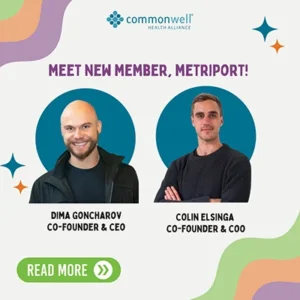We recently caught up with co-founder and COO Colin Elsinga and co-founder and CEO Dima Goncharov of Metriport—one of our newest member companies. Read below to learn more about Metriport and the value they bring to both CommonWell and the larger health care industry.
Kind of like a mullet, we started off all business, but made time to share some laughs at the end.

Tell us more about Metriport – what makes it unique?
We are the world’s first healthcare data API that is open-source, which brings new and unique value to the market in the following ways:
- Reliability — At Metriport, we have this concept that open-source equals “immortal code”. If a closed-sourced company goes out of business tomorrow, all of their customers are left with nothing. With the open-source approach, our customers can sleep at night knowing they always maintain the ability to self-host the crucial code they rely on.
- Security — Because our source code can be externally audited any time, security vulnerabilities or other issues can be identified and addressed quicker than closed-source.
- Transparency — We’re providing transparency into how everything is built, so companies can build on top our solution and innovate, rather than having to reinvent the wheel every time. No more blackboxes!
Why did you choose to join CommonWell?
When we set out to build our Medical API, joining CommonWell was our number one priority, considering the size and value the network brings. The fact that we could leverage the CommonWell Record Locator Service, to enable access to over 200 million individuals’ medical records, was essential for delivering value to our customers. We were also blown away that there were no existing open-source API venders that were part of the Alliance prior to us joining, so we were also very motivated to bring a legitimate, transparent alternative to the space.
How does CommonWell enhance your product – what’s the benefit to providers? To patients?
Through Treatment data exchange, we’re able to ensure clinical accuracy and completeness of medical information to the providers we work with, delivering them comprehensive data for their patients at the point of care. We take this a step further by standardizing, de-duplicating, consolidating, and hydrating the data, along with medical code crosswalking. This allows providers to get a rich understanding of their patients’ clinical histories – resulting in more informed clinical decisions and better patient health outcomes. Not to mention it’s a hell of a lot faster than fax, which surprisingly a lot of companies still rely on!
What stood out to you most about the CommonWell culture as a new member?
Our entire experience joining CommonWell was very welcoming — Paul and Liz were super friendly from day one, making sure any questions we had would get answered, ensuring we could reach out whenever we needed support. This was super motivating for us, being new members of the Alliance.
What is the future of electronic health data exchange?
We obviously see the future of health data exchange being open-source, with a strong emphasis on community and collaboration. This will lead to faster, more meaningful innovation in the world of interoperability, which will enable a new wave of exciting companies to emerge in healthcare that weren’t previously possible. We also see other forms of consumer-generated health data, such as data from wearables like Fitbit, Garmin, and Oura fitting into the mix of shared, clinically relevant data.
CommonWell is a candidate QHIN and eager to support building TEFCA. Do you believe TEFCA will take interoperability to the next level?
Yes! We were very excited to learn of CommonWell’s approval to potentially become one of the first designated QHINs, and we’re quite optimistic on what TEFCA will mean for the future of interoperability. Right now we’re watching these developments closely and hoping for the best, but also planning for the fact that it still could take a while for more significant changes to take place.
Are QHINs real?
Are birds real?
What is your favorite podcast or tv show and why?
Probably the “Dalton & Michael” series on Y Combinator’s YouTube channel. They’re always putting out new content that’s pretty much essential startup advice. Not only do they share valuable knowledge on how to build a great company, they also share many lessons on what not to do. Listening to them really brings us back to being in YC again, as their personalities are very much the same on the podcast as they are in person.
What’s your go-to way to unwind and relax when you’re not working?
We’re always working… 😎
